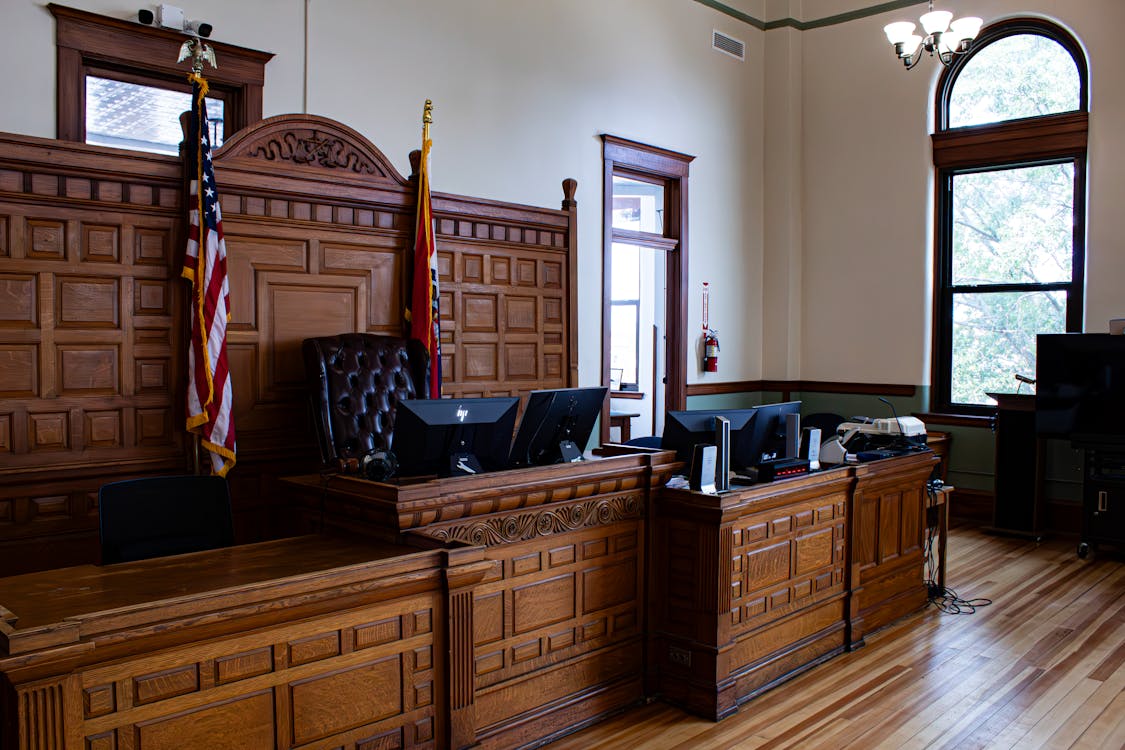
(Photo : Zachary Caraway)
Courtroom (Representational Image)
- Donald Trump has requested a delay in his sentencing in a hush money case until after the November 5 election.
- Trump's legal team argues that the sentencing would interfere with the election and not allow enough time for a potential appeal.
- Trump was convicted of falsifying business records to cover up a $130,000 payment to Stormy Daniels before the 2016 election.
- The outcome of Trump's sentencing could influence public perception of him as a candidate in the upcoming election.
In a significant development, former U.S. President Donald Trump has requested a New York judge to postpone his sentencing in a hush money criminal case until after the November 5 election. The sentencing is currently scheduled for September 18, less than two months before the election in which Trump is the Republican nominee for president. The decision on this request is expected to be made by Justice Juan Merchan.
Trump's legal team, led by lawyers Todd Blanche and Emil Bove, urged Justice Merchan in August to delay the sentencing, citing naked election-interference objectives. They argue that there would not be enough time before the sentencing to potentially appeal the judge's forthcoming ruling on Trump's request to overturn the conviction due to the U.S. Supreme Court's July 1 decision on presidential immunity.
The Role of the Manhattan District Attorney
The Manhattan District Attorney, Alvin Bragg, who brought the charges against Trump, has taken no position on Trump's request. The prosecutors said in a Thursday night court filing that the judge told the parties he would decide on Friday. Bragg's office argued its case involved Trump's personal conduct, so the verdict should stand.
In the first criminal trial of a former or current U.S. president, Trump was convicted on May 30 of falsifying business records to cover up his then lawyer's $130,000 payment to adult film actress Stormy Daniels for her silence before the 2016 election about a sexual encounter she says she had with Trump a decade earlier. Trump denies the encounter and has vowed to appeal the verdict.
Falsifying business records is punishable by up to four years in prison, though sentences such as fines or probation are more common.
The Supreme Court's Ruling and Its Impact
The Supreme Court's 6-3 ruling, which related to a separate criminal case Trump faces, found that presidents cannot be criminally prosecuted for their official acts, and that evidence of presidents' official actions cannot be used in criminal cases involving unofficial actions. This ruling has been a significant point of contention in Trump's case, with his defense arguing that the payments were indeed for legal work and so were correctly categorized.
The upcoming election season is already heating up, with the first presidential debate between Vice President Kamala Harris and former President Donald Trump set for September 10. The first mail ballots will start going out to voters on Friday, and early in-person voting will start as soon as September 20 in some states.
The outcome of Trump's sentencing could potentially influence public perception of him as a candidate, adding legal controversy to his campaign. In a historical context, this case is unprecedented. Never before has a former or current U.S. president faced a criminal trial. The Supreme Court's ruling on presidential immunity has added another layer of complexity to the case.









